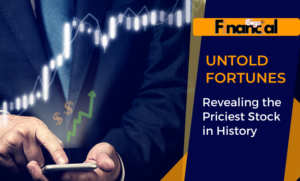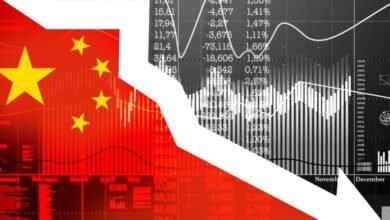Untold Fortunes: Revealing the Priciest Stock in History

Untold Fortunes: Revealing the Priciest Stock in History
In the dynamic world of finance, the allure of high-value stocks continues to captivate investors and analysts alike. Among these, the priciest stock in history stands as a testament to extraordinary market valuations and the intriguing factors that propel a company’s share price to unparalleled heights. This exploration into the realm of expensive stocks unveils the intricacies behind evaluating a stock’s worth, delves into the annals to highlight historical giants of the stock market, and scrutinizes the elements that drive a stock’s price to its zenith, all while considering the ramifications for the companies concerned and the investors who hold these prized assets.
Untold Fortunes: Revealing the Priciest Stock in History Understanding the Value of a Stock
When it comes to investment portfolios, stocks represent more than just pieces of a company; they symbolize potential wealth, strategic positions in the market, and the intriguing dance of supply and demand. However, not all stocks are created equal. Some, like the priciest stock in history, transcend typical valuations, becoming icons of economic strength and investor confidence.
The value of a stock is determined by a myriad of factors, including but not limited to the company’s current profitability, potential for growth, market demand, and overall economic conditions. It’s a complex interplay that can drive the price of a stock to unprecedented heights, earning it the title of the “Priciest Stock in History.”
For investors, understanding the value of a stock is crucial. It’s not merely about the price tag; it’s about comprehending what contributes to that valuation. Is it the company’s innovative edge? Its monopoly in a particular market? Or perhaps its robust earnings report year after year?
By grasping these underlying factors, investors can make informed decisions, distinguishing between a potentially overvalued bubble and a genuinely valuable gem poised for long-term growth. The quest for the priciest stock in history is not just about the bragging rights; it’s a pursuit of understanding what makes a company truly invaluable in the eyes of the market.
The Historical Giants: A Look at Past High-Value Stocks
The journey to identifying the priciest stock in history isn’t just about pinpointing a single record holder. It’s also about understanding the evolution of stock values over time, shining a light on those historical giants that have set unprecedented benchmarks in the financial markets. Throughout history, several stocks have distinguished themselves, not just by their performance but by their extraordinary value, contributing significantly to our understanding of what propels a stock to become the priciest stock in history.
Noteworthy High-Value Stocks Throughout History
- Berkshire Hathaway: Warren Buffet’s flagship, often holding the title for the priciest stock in history due to its astronomical share price, avoiding stock splits to retain its value.
- Seaboard Corporation: While not matched the heights of Berkshire Hathaway, it has consistently been a high-value stock, owing to its low volume and robust business model.
- NVR Inc.: An under-the-radar but equally significant player, NVR Inc. has demonstrated sustained value, attributing its stock price to a strategic business model focusing on homebuilding and mortgage banking.
This historical perspective is not just about laudation but also highlights a crucial factor: a high stock value typically mirrors a company’s robust fundamentals, strategic business decisions, and, most importantly, its rarity and uniqueness in the market. These giants have laid down a marker, setting the stage for what would eventually become known as the priciest stock in history. Their legacy serves as a testament to the factors that can propel a stock to unparalleled heights and what investors might look for when searching for the next big value stock.

The Current Record Holder: The Priciest Stock in History
When discussing the priciest stock in history, Berkshire Hathaway often steals the spotlight. This company’s Class A shares have reached astronomical prices, making them the current record holder for the priciest stock in history. Unlike many other companies that opt for stock splits to make their shares more accessible to a broader range of investors, Berkshire Hathaway has famously abstained from splitting its Class A shares. This strategy has contributed significantly to its shares reaching and maintaining such high market values.
A comparison of Berkshire Hathaway’s Class A shares with other high-value stocks reveals the sheer scale of its uniqueness. While other companies may boast stock prices in the hundreds or even low thousands, Berkshire’s Class A shares have consistently traded in the hundreds of thousands, with notable peaks surpassing the 300,000-dollar mark per share.
This exceptional valuation is not just a result of market speculation but is underpinned by the conglomerate’s vast and diverse portfolio of successful businesses and investments. It’s a testament to Warren Buffett’s investment strategy, emphasizing long-term value over short-term market trends. The price tag of Berkshire Hathaway’s shares reflects the company’s overall value and the trust investors place in its leadership and direction.
The title of “Priciest Stock in History” is thus not just an interesting trivia fact but a significant indicator of Berkshire Hathaway’s enduring value and influence in the financial world.
Factors That Drive a Stock’s Price to Sky-High Levels
When contemplating the dynamics behind the Priciest Stock in History, it’s essential to understand the multifaceted factors that elevate a stock’s value to unprecedented heights. These elements intertwine to propel select stocks into the stratosphere, distinguishing them from their counterparts.
- Scarce Supply, High Demand: A fundamental rule of economics—when a stock’s availability is limited, and the demand persists or increases, its price escalates. This scarcity can surge a stock’s value, making it a contender for the title of the Priciest Stock in History.
- Remarkable Earnings and Growth Prospects: Companies that consistently demonstrate an ability to significantly increase revenues and profits, or those with the potential for exponential growth, often see their stock prices soar. Investors are willing to pay a premium for shares in a business they believe will continue to expand and succeed over time.
- Innovative Leadership and Market Dominance: Organizations under visionary leadership and with products or services that command substantial market share contribute to the rarity of exceedingly high stock prices. These companies often redefine industries, creating substantial value for shareholders.
- Economic and Market Conditions: Micro and macroeconomic factors, including interest rates, inflation, and overall market sentiment, can influence a stock’s price. In periods of economic prosperity, investors may be more inclined to invest in stocks, pushing prices higher.
Understanding these critical drivers is indispensable for investors contemplating investments in high-value stocks, such as the Priciest Stock in History. These elements not only explain past price achievements but can also provide insights into potential future trends.
The Impact of Holding the Most Expensive Stock on a Company
When a company earns the title of having the “Priciest Stock in History,” it’s not just a headline-grabbing accolade; it’s a marker of the company’s robust financial health, strong leadership, and innovative products or services. The implications of this status on a company are multifaceted, influencing its market perception, investor base, and strategic opportunities.
Market Perception: Holding the priciest stock in history can significantly elevate a company’s prestige. It sends a strong signal to the market about the firm’s stability, growth potential, and resilience, potentially attracting more investors and boosting the company’s stock further. This perception of success can become a self-fulfilling prophecy, encouraging more positive media coverage and analyst attention.
Investor Base: The allure of the priciest stock often brings a different calibre of investors, including institutional investors and high-net-worth individuals looking for proven performers. This can lead to a more stable shareholder base, which is less prone to panic selling, providing the company with a level of financial stability during market fluctuations.
Strategic Opportunities: With high stock prices, companies find themselves in a favorable position to leverage their shares for strategic initiatives. They can utilize stock-based compensation to attract top talent or execute stock splits to make shares more accessible without diluting the value, maintaining investor interest.
However, the distinction of holding the priciest stock in history comes with its challenges. There can be heightened expectations for continued performance excellence, putting pressure on the company’s management to sustain or enhance growth. Moreover, any misstep might be magnified, causing significant stock price fluctuations.
In conclusion, while the title of “Priciest Stock in History” is emblematic of a company’s current success, it necessitates a delicate balance of innovation, strategic planning, and communication to continue thriving. The impact of this status extends beyond stock price—it reshapes the company’s identity, opportunities, and challenges in the global market.
Investor Perspectives: Is Buying High-Value Stocks Worth It?
Investors frequently ponder whether purchasing the priciest stock in history can lead to unprecedented returns or if it’s akin to chasing a mirage. The allure of holding a part of a financially titanic entity is undeniable but requires a nuanced understanding.
Pros:
- Long-term Growth: High-value stocks often belong to companies with robust foundations and proven resilience, suggesting potential for long-term growth.
- Prestige: Owning shares in the priciest stock in history carries prestige, indicating an investor’s serious commitment and financial capability.
Cons:
- High Entry Point: The cost barrier is significant, limiting accessibility for average investors and posing a high risk if the market takes a downturn.
- Volatility: Despite their status, even the stocks of market giants are not immune to volatility, influenced by broader economic factors and sector-specific risks.
Considering these aspects, the question of worthiness is subjective. For investors with deep pockets and a penchant for patience, buying into the priciest stock in history might align with their strategy of acquiring stakes in companies that have not only demonstrated exceptional performance but also hold the promise of continuity in excellence and innovation.
However, for those more risk-averse or seeking quicker, more diversified returns, such high-value stocks might not be the most suitable route. In essence, it boils down to an investor’s financial goals, risk tolerance, and investment horizon.
The Future of High-Value Stocks: Trends and Predictions
As the financial landscape evolves, so too does the intrigue surrounding the priciest stock in history. Speculation abounds regarding the trajectory of high-value stocks, influencing both market dynamics and investor strategies. The question on everyone’s mind is, what lies ahead for these financial juggernauts?
Emerging Trends:
- Technological Advancements: As industries continue to innovate, technology sectors are likely to produce the next contenders for the title of the priciest stock in history. This is supported by the rapid growth and scalability that tech companies have demonstrated in the past decade.
- Global Economic Shifts: The globalization of markets can lead to a reevaluation of stock values, as companies that successfully tap into emerging markets may see unprecedented increases in their stock prices.
Predictions for the Future:
- Increased Volatility: The quest for the priciest stock in history may lead to greater volatility in the stock market, as investors chase potential high-value opportunities.
- Selective Investor Participation: Given the enormous financial commitment required to invest in the priciest stock in history, a more selective group of investors, primarily consisting of institutional investors and high-net-worth individuals, will dominate this space.
- Focus on Sustainable Growth: Companies that not only show potential for rapid growth but also sustainability and resilience in their business models are likely to be the ones that attain and hold the title of the priciest stock in history.
In conclusion, while the allure of holding the priciest stock in history continues to captivate the imagination of investors, it is clear that the path forward is fraught with both opportunities and challenges. By staying informed of these trends and predictions, investors can better navigate the complexities of the high-value stock landscape.



